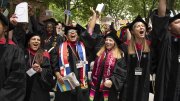Harvard Yard could not have been lovelier than in the spring of 2025, as cool weather extended a lush period of bloom, and the rhododendrons’ display coincided with a late May Commencement. But the climate on campus did not always match. Just months after it seemed that the internal turmoil of the 2023-2024 academic year had passed—engendered first by the Israel-Palestine conflict and then the resignation of Harvard President Claudine Gay—the full-bore assault on Harvard by the federal government began.
Hardly a week passed this spring without news of some further deprivation: first the freezing of $2.2 billion in research funding; then legislation to tax investment gains in endowments of nonprofit institutions of higher education; then an order to revoke Harvard’s ability to allow international students to study and contribute to campus life. Harvard is fighting back, and much of the discourse and the speeches during the week leading up to Commencement—and the Commencement Day ceremony itself—reflected on the broad threat to U.S. higher education and its values, and the response.
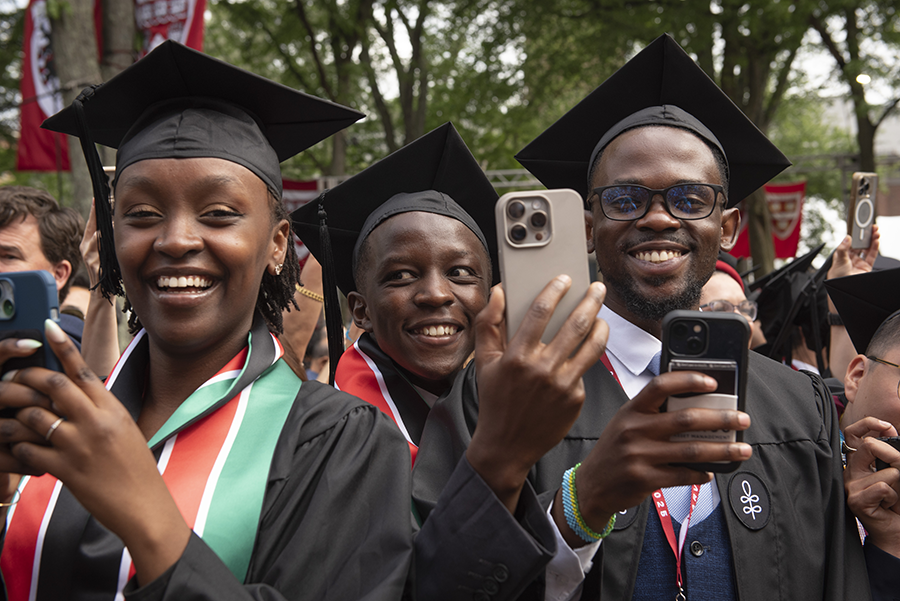
Thursday’s ceremony also included an indelible musical moment that nodded to the values of welcoming and hope: a student rendition of “Somewhere,” from the musical West Side Story, which brought one honorary degree recipient and some in the audience to tears.
Higher Ed in Crisis
At the Phi Beta Kappa Literary Exercises, Danoff Dean of Harvard College Rakesh Khurana drew a standing ovation when he praised President Alan M. Garber for modeling “what it means to stand for principle over expedience in the face of these threats. His steady leadership has reminded us that the legitimacy of our institutions depends not just on what we know, but how we act and commit to veritas.”
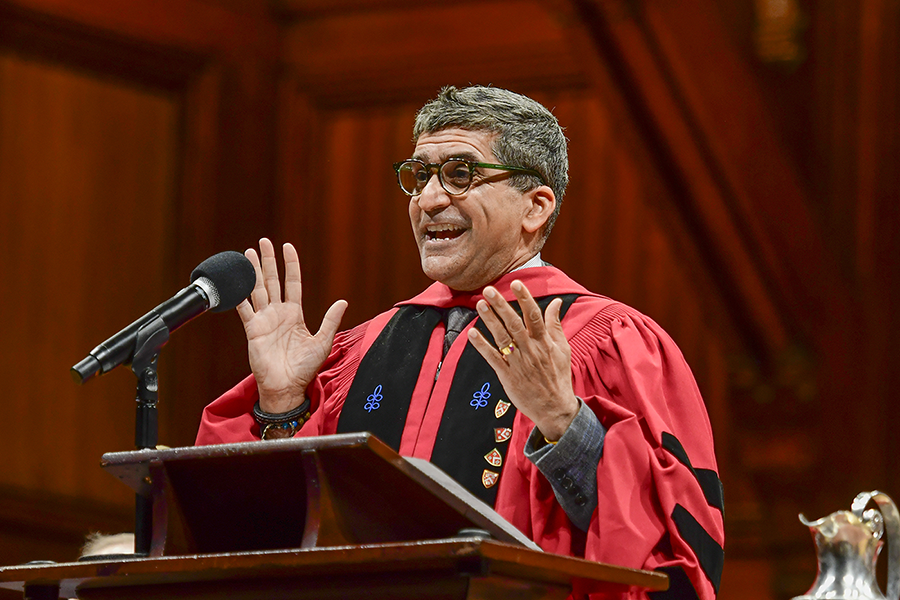
In his Baccalaureate address later that same day, Garber himself urged seniors graduating from Harvard College to “advocate for education.” And in speeches across the campus from Cambridge to Boston, in class days and convocations, and in the unauthorized celebrations of affinity groups (black, Latinx, Asian and Asian American, and LBGTQ+ students, as well as veterans, first-generation and low-income students, and students with disabilities) the story was about resistance.
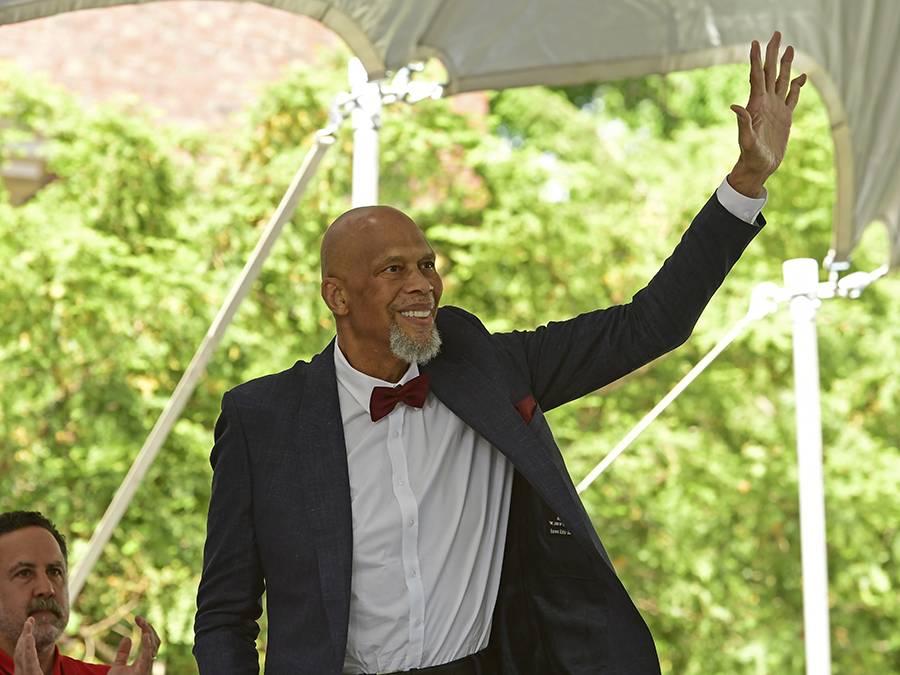
At Harvard College Class Day on Wednesday, Kareem Abdul-Jabbar, on whom an honorary doctor of laws was conferred the next day, recalled Dr. Martin Luther King Jr.’s response after the 1956 bombing of his home by segregationists: “Remember that if anything happens to me, there will be others to take my place.” In Harvard, Abdul-Jabbar said, he sees evidence that King’s confidence was justified: “After seeing so many towering billionaires, media moguls, law firms, politicians, and other universities bend their knee to an administration that is systematically strip mining the U.S. Constitution, it is inspiring to me to see Harvard University take a stand for freedom.”
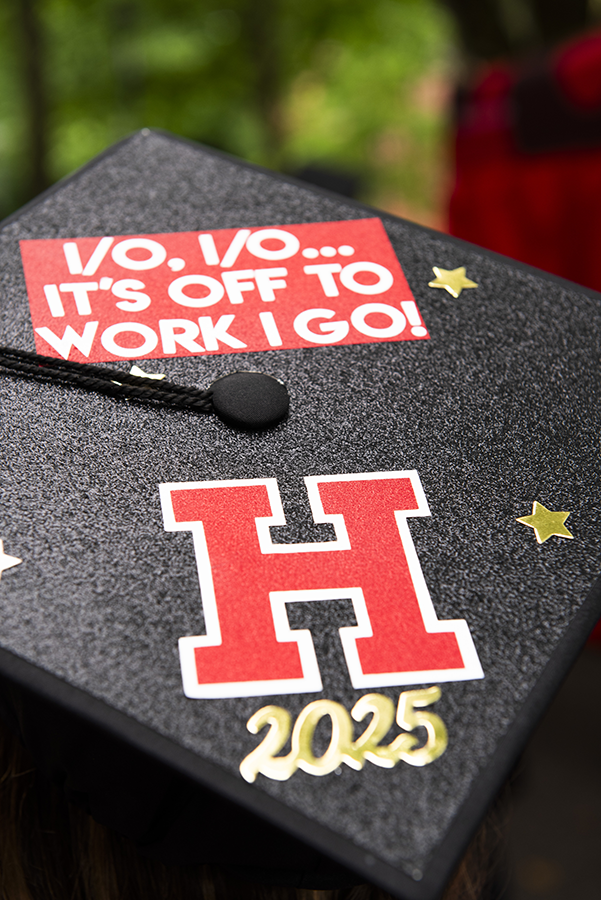
At the School of Public Health’s convocation, infectious diseases expert Céline Gounder, the keynote speaker, described a “war on science.” At the Harvard Medical School Master’s Convocation ceremony, Dean George Q. Daley described Harvard as “the most direct target of the current administration’s tectonic shift in priorities,” amidst “catastrophic funding cuts” in which “essential life-saving research is being canceled altogether.”
And at the Graduate School of Education, Hobbs professor of cognition and education Catherine Snow tried to make sense of “the challenges to education and the academy that are facing us,” but also implicated the University in the current political atmosphere:
I’ve come to realize now how naive we’ve been to assume that the values that Harvard stands for are widely shared, that producing life-enhancing and lifesaving research was enough to justify our existence, that the undeniable benefits of constituting a student body that is heterogeneous—I think that’s a word we can still use—heterogeneous in national origins, in ethnicity, in language, in culture, and experience—that those benefits would be obvious to all. It seems, though, that we have failed somehow to communicate our strongest commitment and deepest values in ways that make sense to many of our fellow citizens, and that is our failure.
Perhaps our focus on performative actions, on pronouns and anti-racist workshops and diversity slogans, has masked the degree to which those performances represent, however inadequately, deep commitments to shared values; to an effort to create a world in which words like marginalized and minoritized are no longer necessary, and in which diversity is valued for its undeniable contributions to a group’s effective functioning and to individuals’ critical thinking.
Commencement
Garber echoed those sentiments on Commencement Day, taking the stage to raucous applause after the traditional call to order by Peter J. Koutoujian, M.P.A. ’03, the sheriff of Middlesex County, a rendition of “The Star-Spangled Banner” by vocalist Madison Webb ’25, and an opening prayer from Reverend Gloria E. White-Hammond. (The forecast for the day had been for an almost even chance of rain, but—despite black clouds overhead—the assembly was spared a deluge.)
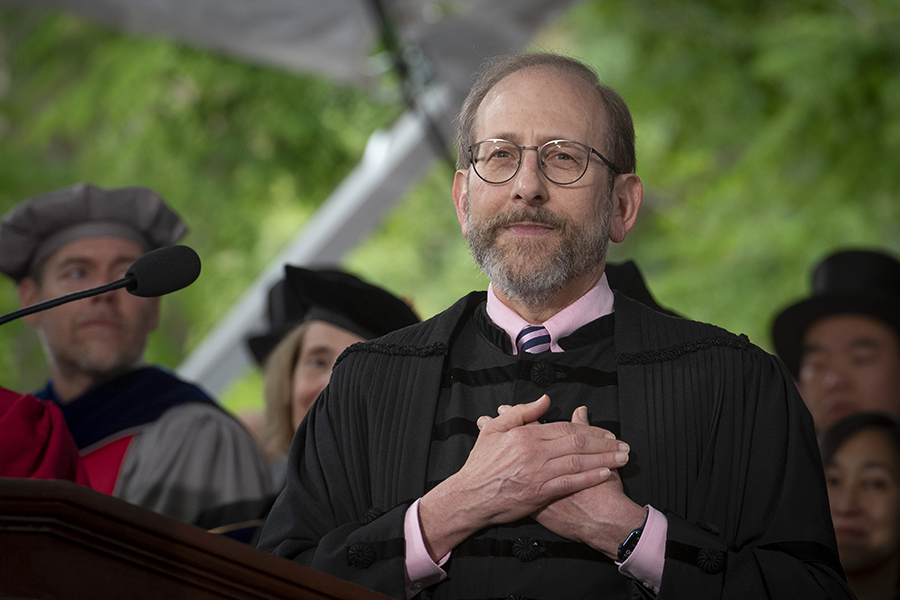
After emphasizing that he was welcoming graduates from “around the world, just as it should be,” he warned against complacency. He also sent what seemed a pointed message about a campus atmosphere, and approach toward disagreement, that he has tried, in recent months, to reform. (Those protests, with their familiar contours, showed brief glimmers that day: a student tried to unfurl a “Free Palestine” sign from a bathroom window, but was stopped by security guards; doxxing trucks assailing “Harvard’s leading antisemites” hovered outside the Harvard Yard gates.)
Garber said:
The world as it is tempts us with the lure of what one might generously call comfortable thinking, a habit of mind that readily convinces us of the merits of our own assumptions, the veracity of our own arguments, and the soundness of our own opinions, positions, and perspectives—so committed to our beliefs that we seek information that confirms them as we discredit evidence that refutes them.
Though many would be loath to admit it, absolute certainty and willful ignorance are two sides of the same coin, a coin with no value but costs beyond measure. False conviction saps true potential. Focused on satisfying a deep desire to be right, we can willingly lose that which is so often gained from being wrong—humility, empathy, generosity, insight—squandering opportunities to expand our thinking and to change our minds in the process.
Then it was time for the student speakers’ Big Moments (read about each orator here).
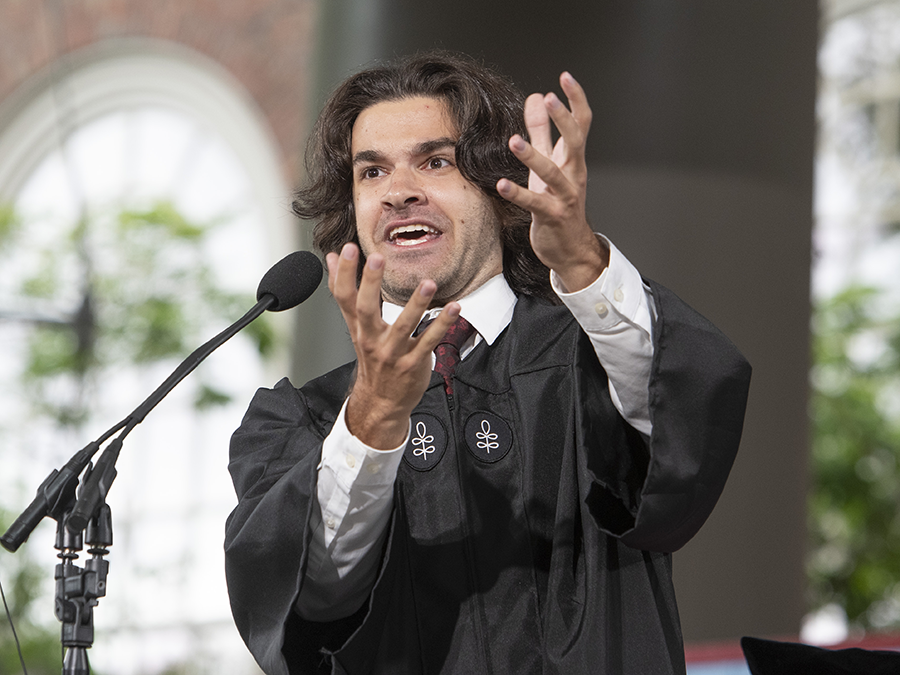
Latin Salutatorian Aidan Robert Scully ’25
In his speech, “De Haereditatibus Peregrinis” (“Regarding Foreign Inheritances”), Scully highlighted what he calls all of the “foreign” languages at Harvard. “Some of us speak the language of history, others the language of science,” he said before Commencement. “The fact that we are all sort of thinking in these different ways and seeing the world in different ways is really our greatest strength.”
Read Scully’s full text, in Latin and English, here.
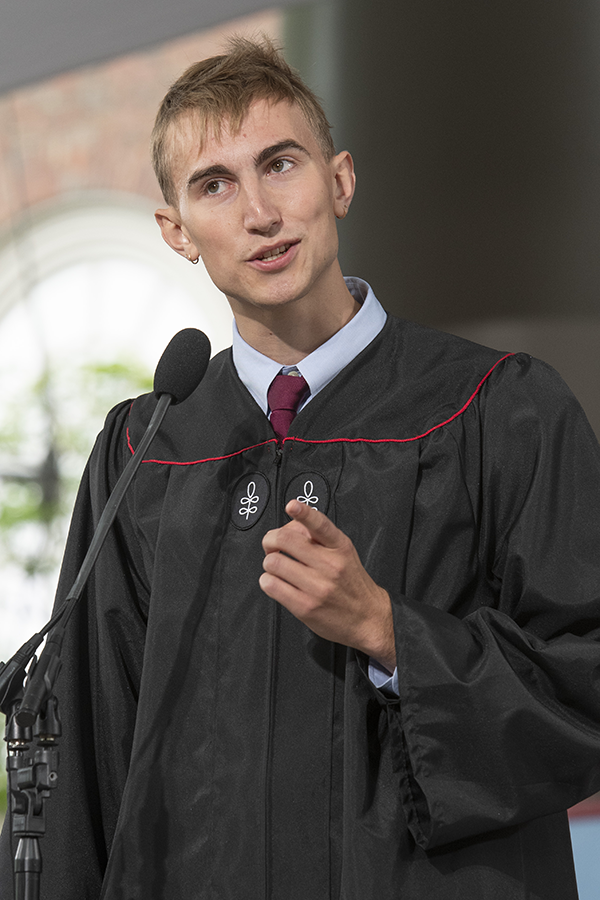
Senior English Orator Thor Reimann ’25
Reimann based his speech on an Emily Dickinson poem, “This World is not Conclusion,” which he read during his first-year literature course, Humanities 10. “The gist of the poem is you don’t really know what’s coming next, but something’s out there,” he said before Commencement. “Ostensibly, the poem on its face is probably about death,” he continued. But for this context, Reimann prefers to think of the conclusion as Commencement.
Read Reimann’s full text here.
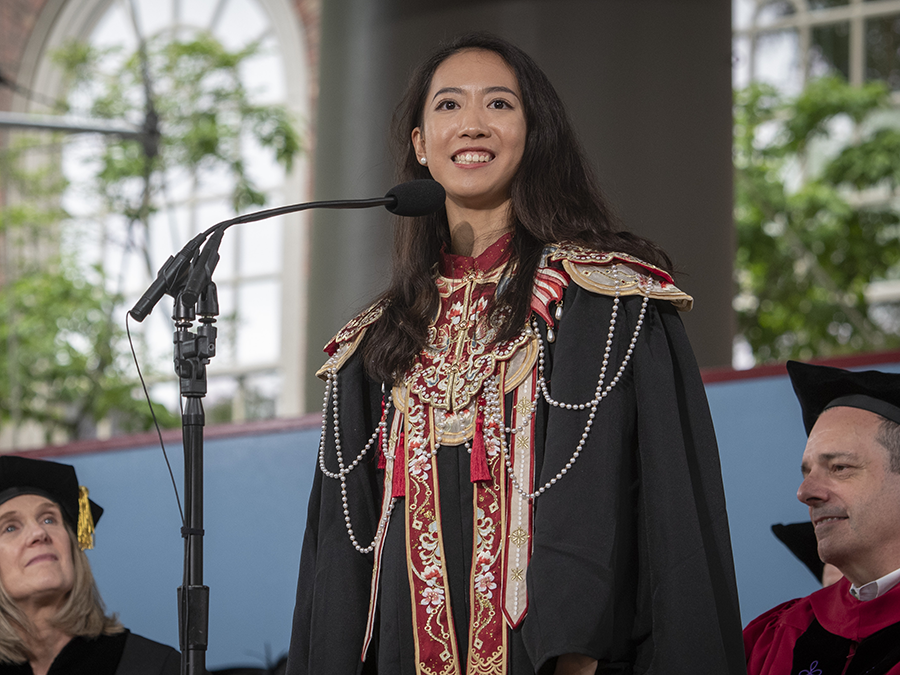
Graduate Orator Yurong “Luanna” Jiang, M.P.A. ’25
Jiang wrote her speech as the U.S. government was threatening to revoke Harvard’s ability to host international students, and she said she felt a “moral responsibility” to share a message of “common humanity.” “In a very divided world, we should refuse to demonize those we disagree with and learn to see the human in them.”
Read Jiang’s full text here.
Following the student speaking parts, the Commencement Choir performed an anthem, “Earth Song.”
Conferring of degrees
Then it was Provost John F. Manning’s turn to explain the process through which Harvard actually confers degrees: by a presidential act of speech, as authorized by the governing boards, on each cohort of students en masse, with the assistance of the various deans of Harvard’s schools. The anthem based on Psalm 78 (St. Martin’s), a tradition dating back to the inception of Harvard Commencements, was sung to break up the conferral, as was the anthem “Love Will Guide Us.” (Students get diplomas later, one by one, in ceremonies at the undergraduate Houses and their respective schools and other venues.) This year, the customary formalities by each dean were back, after a hiatus during the unusual circumstances of the 373rd Commencement: “Mister President, Fellows of Harvard College, Mister President and Members of the Board of Overseers: As Dean” of whatever school, presenting degree candidates, and the president’s refrain of, “By virtue of authority delegated to me….”
The Honorands
THE UNIVERSITY then celebrated the accomplishments of a half-dozen honorary-degree recipients (described in detail here), with the provost introducing each and Alan Garber reading the citation and conferring their Harvard degrees, in this order:
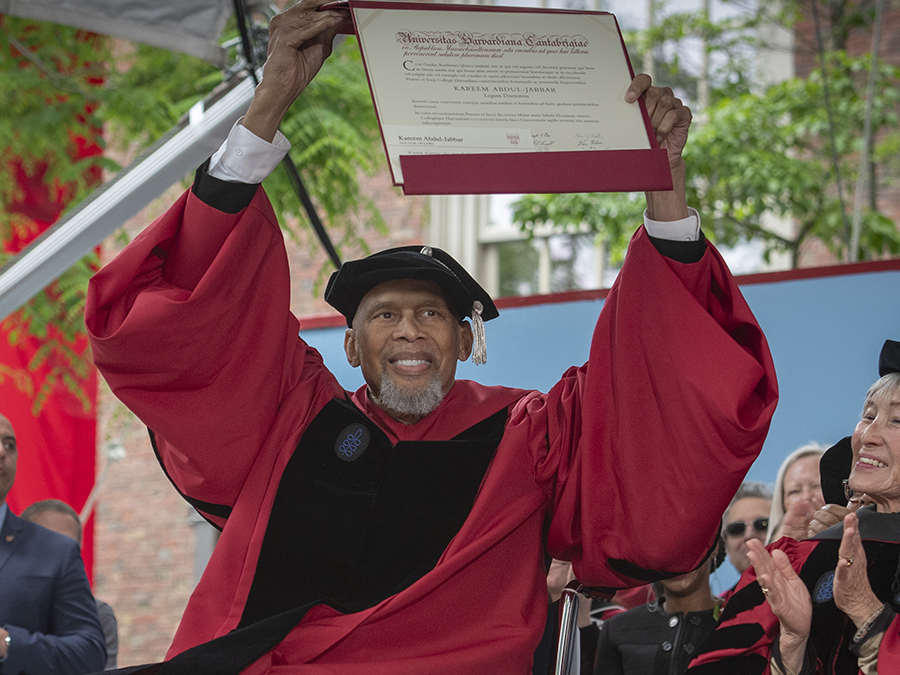
Kareem Abdul-Jabbar, Doctor of Laws. A star professional basketball player, now a writer and activist, Abdul-Jabbar delivered the Class Day address to graduating seniors on May 28. The only player in NBA history to win six Most Valuable Player awards, he is widely regarded as one of the greatest basketball players of all time. After retiring in 1989, he turned his focus to activism, writing, and public speaking, often addressing the country’s legacies of racism and inequality. Garber read:
A tower of power who propelled his teams to triumph;
an avid proponent of pluralism’s promise;
the arc of his sky hook is long
but it bends toward justice.
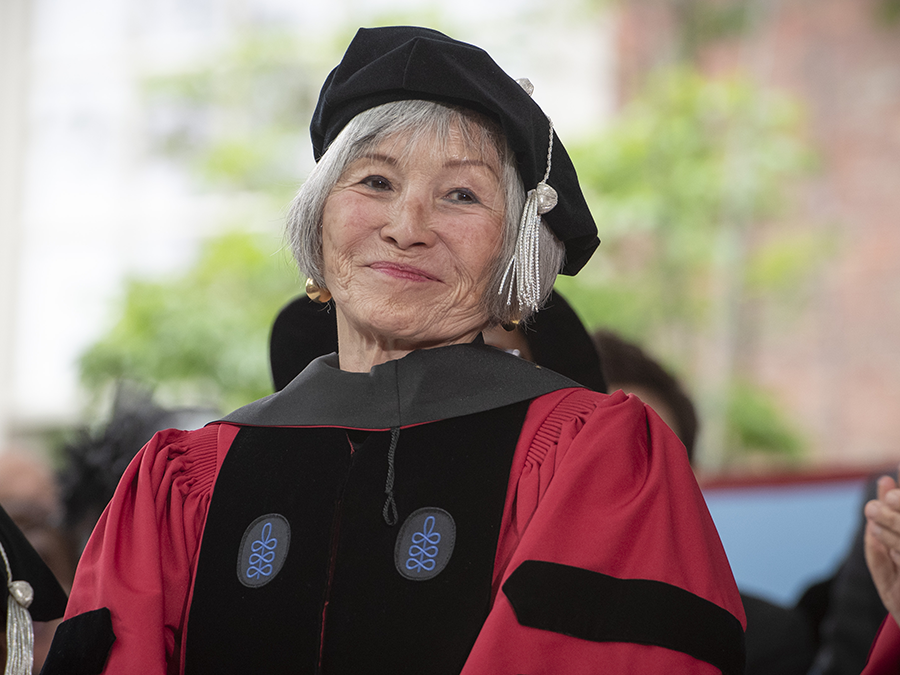
Elaine H. Kim, Doctor of Laws. Professor emerita in Asian American studies and ethnic studies at the University of California, Berkeley, Kim is a writer, editor, and community activist who has led the way in the study of the Asian immigrant experience. Garber read:
Pathmarking scholar of Asian American lives,
spanning literature and art, labor and gender;
dynamic in devotion to building community,
she sees that making waves can help raise the tide.
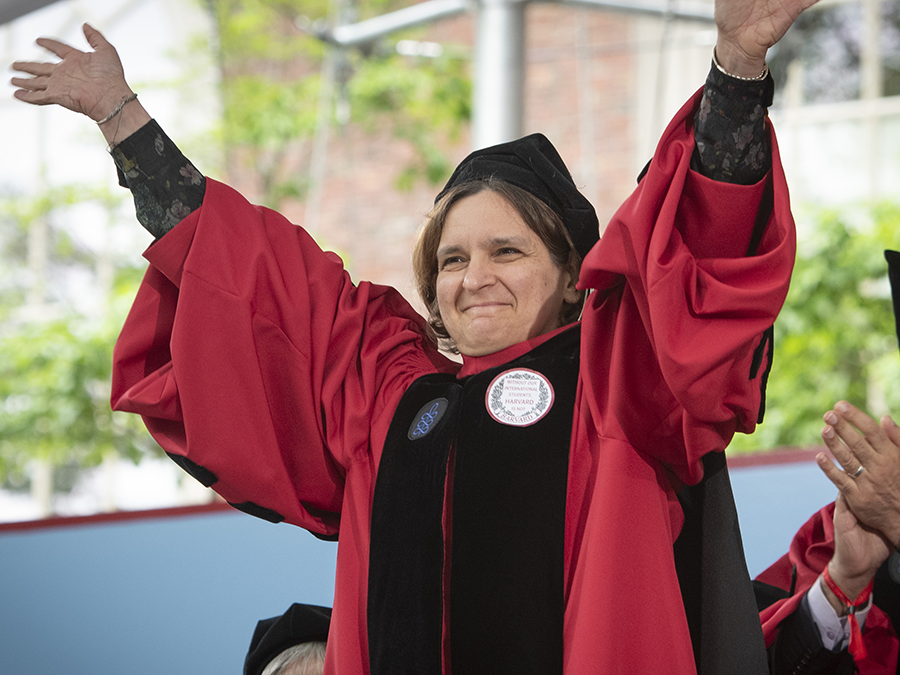
Esther Duflo, Doctor of Laws. The Jameel professor of poverty alleviation and development economics at MIT, Duflo helped develop an experimental approach to poverty alleviation, using randomized controlled trials to test the efficacy of various interventions. Duflo was awarded the 2019 Nobel Prize in economics together with her long-term collaborators Michael Kremer and Abhijit Banerjee (who is also her husband). Garber read:
Devoted to easing the burdens of poverty
with a wealth of ideas and experimental savvy,
she personifies the ethos of a childhood hero:
‘The greatest good is what we do for others.’
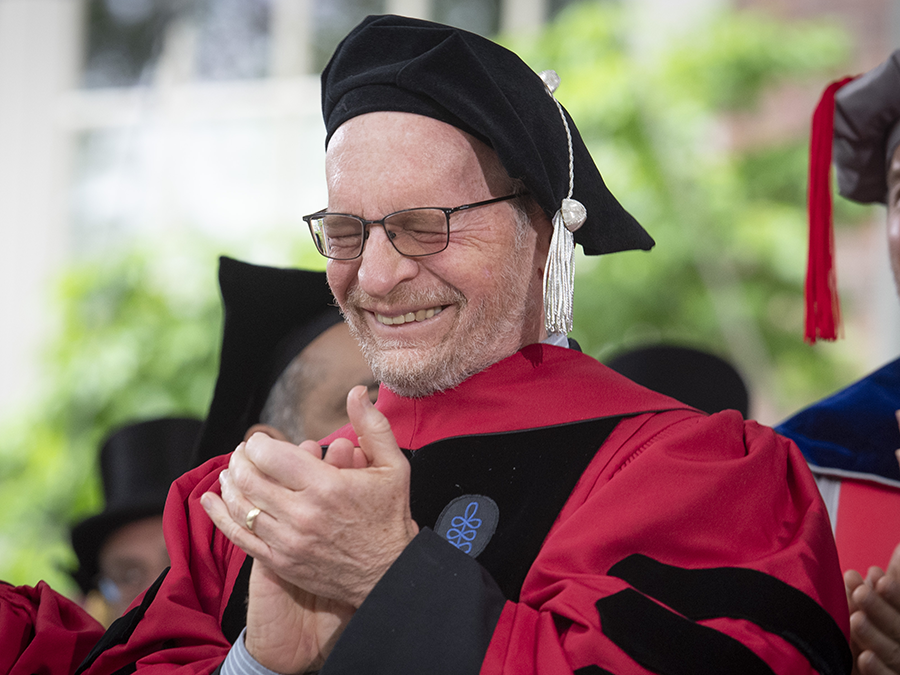
Richard B. Alley, Doctor of Science. Alley, the Pugh University Professor of Geosciences at the Pennsylvania State University, leads an ice and climate exploration group that studies the Greenland and Antarctic ice sheets from space, in the field, and with computer models to understand their history and their future. He was awarded the National Medal of Science in 2025 by U.S. President Joseph Biden, in part for his work to understand how ice affects patterns of ocean circulation, and for his discovery that Earth’s great ice sheets melted suddenly at the end of the last ice age. Garber read:
A pioneer in probing Earth’s paleoclimate,
a guru in expounding glacial dynamics,
he exerts a tectonic impact on how we understand our planet,
extracting groundbreaking insights from his ice-breaking exploits.
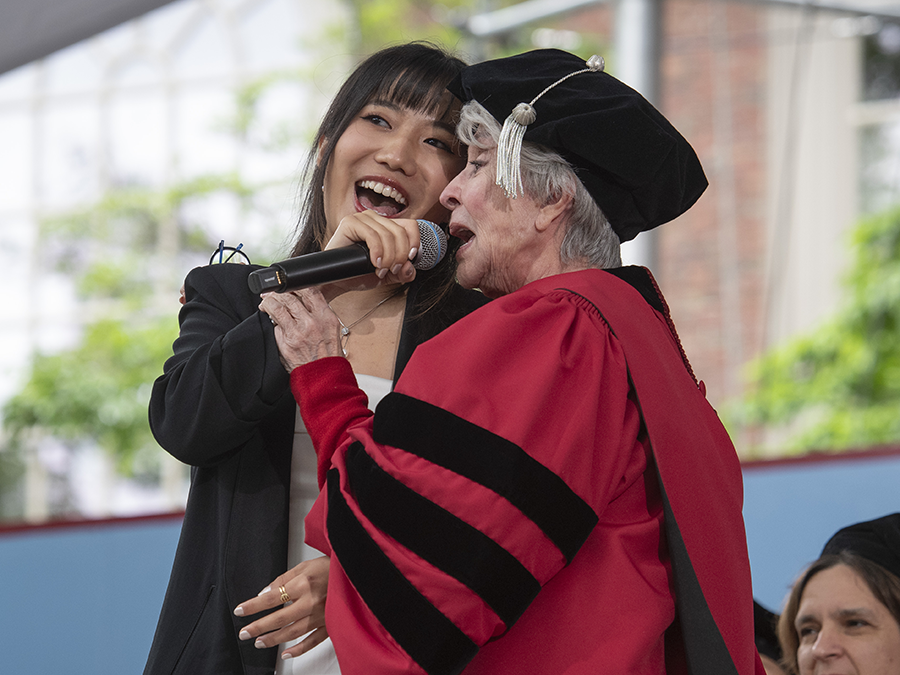
Rita Moreno, Doctor of Arts. A dancer, singer, and actress, Moreno has appeared in some of Hollywood’s best-known movie musicals, including Singin’ in the Rain (1952) and West Side Story (1961), in which she played Anita; more recently, she appeared as a grandmother in the revival of the TV sitcom “One Day at a Time.” During her 70-year career, she won an Emmy, a Grammy, an Oscar, and a Tony. In 2004, she was awarded the Presidential Medal of Freedom by U.S. President George W. Bush, M.B.A. ’75, for her contributions to the arts. And in 2009, she received the National Medal of Arts from U.S. President Barack Obama, J.D. ’91.
From Anita to Abuelita, decade after decade, one role at a time,
she has captivated audiences with her artistry and ardor;
for all who aspire to achieve their dreams,
she shows there’s a place for us, somewhere.
A soaring musical tribute to Moreno followed: the song “Somewhere” (with music by Leonard Bernstein ’39, D.Mu. ’67), from West Side Story, performed by Carolyn Hao ’26 and Henry Wu ’25. Hao’s lovely singing brought tears to Moreno’s eyes, and she joined in singing at the end.
Abraham Verghese, Doctor of Humane Letters. A physician and writer who is a professor of medicine at Stanford University, Verghese has emphasized the importance of the physician-patient relationship throughout his written work and in his practice. At Stanford, he founded an interdisciplinary center that promotes the importance of the human experience in medicine, and an initiative to enhance bedside exam skills for students and medical professionals. Garber read:
An embodiment of empathy in the wards and through his words,
he exalts the sacred covenant between doctors and their patients
and crafts compelling stories that bespeak his deep compassion.
The degrees bestowed, Garber welcomed the honorands to “this Society of Scholars” and invited the day’s principal speaker, Abraham Verghese, to “address this assembly.” Verghese also made reference to current events and praised Harvard for resisting the federal administration’s demands.
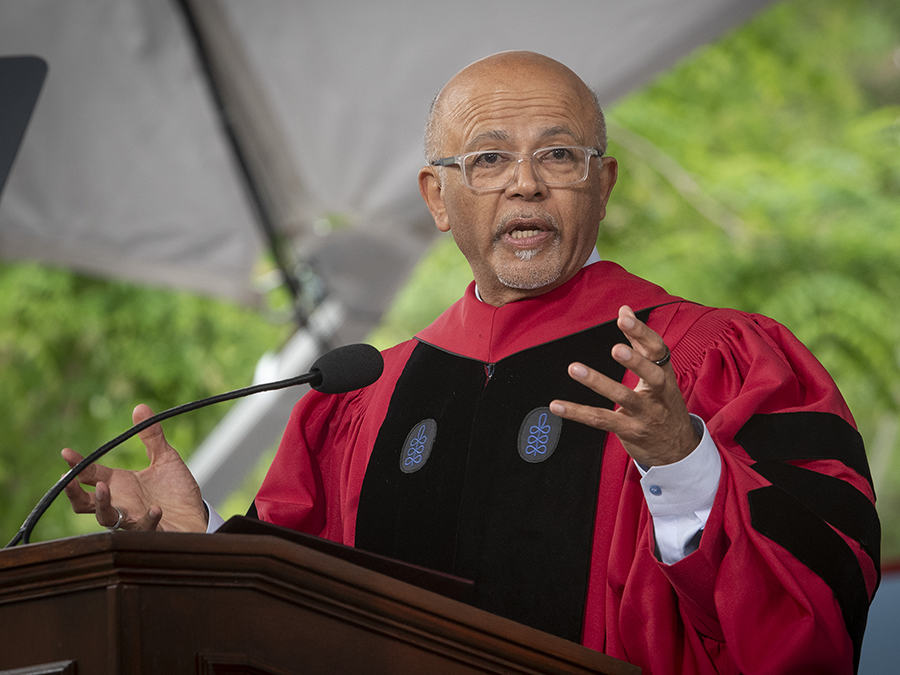
“More people than you realize,” he told the 2025 graduates, “are grateful to Harvard for the example it has set—by your willingness to look inward, to make painful and necessary changes but then ultimately, by your clarity in affirming and courageously defending the essential values of this University, and indeed of this nation.”
He reflected on his own experience as an immigrant to this country, and why this made his message particularly relevant now:
When legal immigrants and others who are lawfully in this country, including so many of your international students, worry about being wrongly detained and even deported, perhaps it’s fitting that you hear from an immigrant like me….Someone who was born in Ethiopia when it was ruled by an autocratic emperor; someone who then lived under the brutal military leader who overthrew the emperor; someone who had at least one of his medical school classmates tortured and disappeared after being tortured, and who saw many other of his classmates join the guerilla force fighting against the military dictator….”
Verghese went on to describe the experience of a medical school classmate, Meles Zenawi, who led those guerilla forces and eventually became prime minister of Ethiopia. When he interviewed Meles years later for a magazine assignment, Verghese recalled, the man recounted the difficult decisions he had to make—such as enlisting a volunteer to walk through minefields at night to find a safe crossing for his army. “Meles said something to me I never forgot: ‘In this office, I try to make sure that every decision I make is worthy of those comrades who gave their lives crossing those minefields so we could get to safety.’”
He continued: “On the walls of Harvard Memorial Church are inscribed the names of students and faculty who gave their lives in various conflicts.…In these past few weeks, in the face of immense pressure, Harvard, under President Garber’s steady leadership, has been very visible for taking decisions worthy of your University’s heritage, decisions that reveal and will shape this University’s character.”
Addressing the graduates directly, he urged them to make their decisions “worthy of the opportunities this great University opened up to you, as it works to preserve the value of what you accomplished here, and the values it stands for.”
Read Verghese’s full speech as delivered here.
Over and Out
Katie O’Dair, the marshal, thanked Verghese for his presence and speech, and then asked the “assembly” (as the program calls everyone present) to do their part by singing “Fair Harvard.”
Then, at a moment when the University was in real need of blessings, the resonant-voiced Pusey Minister Matthew I. Potts rose to give the benediction, on behalf of those who “have survived injury with integrity”:
In its ancient roots, blessing does not confer goodness, it honors it. Blessing does not make something good, it acknowledges what is already good. A blessing is not a spell of protection, it is an act of recognition.
In its medieval roots, meanwhile, the word blessing carries a sense of woundedness. To be blessed means you have endured trials with courage, you have survived injury with integrity. Blessing honors you for who you are, but it also bends its knee before all you have been through.
Harvard Class of 2025: you have come to us from around the globe and together, here, you been through so much. You have been through strife and grief and estrangement and uncertainty and upheaval. You have also done so much: so much good for us, so much good for one another, so much good for the world. No one is perfect, not even at Harvard, and not even you. But if Harvard accomplishes good for the world, it’s because you do. If Harvard is great, it’s because you are. It’s because of you, because you are a blessing.
He concluded:
Beyond this Yard those of us on this stage see other things. We see a range of threats and dangers: to the world, to this University, to many of you, to many of us. But between all of that and all of this, we see you.…And we’ve seen what you can do. Now go and do it.
The sheriff then returned, staff in hand, to close the contemplative mood and adjourn the proceedings at 12:12 P.M. The timing was propitious—the ceremony ended without a drop of rain. And at the same moment, word came that a federal judge had extended a temporary restraining order that prevents the Trump administration from barring Harvard’s enrollment of international students. The news was no victory, however, as the Trump administration’s lawyers signaled that they would seek to accomplish the same end through another means.
Check back at www.harvardmagazine.com for continuing coverage of:
- Harvard’s legal response to threats to revoke international students’ visas; and
- Harvard Alumni Day, June 6, with surgeon, writer, and public health leader Atul Gawande M.D. ’95, M.P.H. ’99 as guest speaker.
